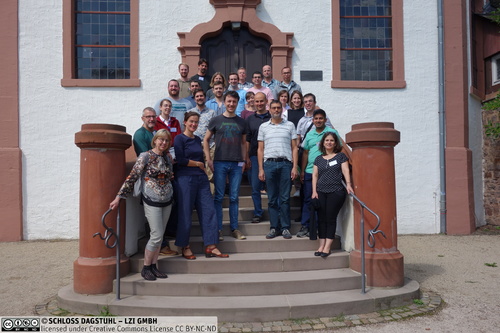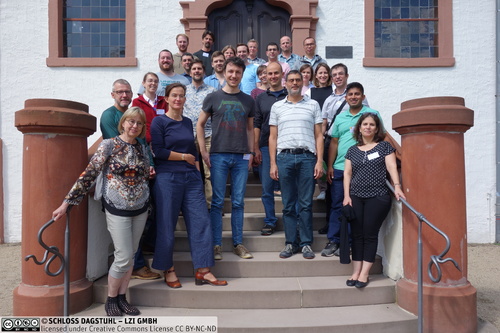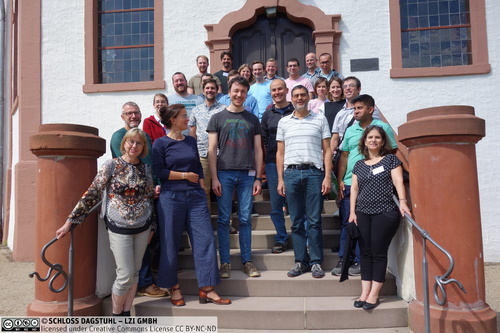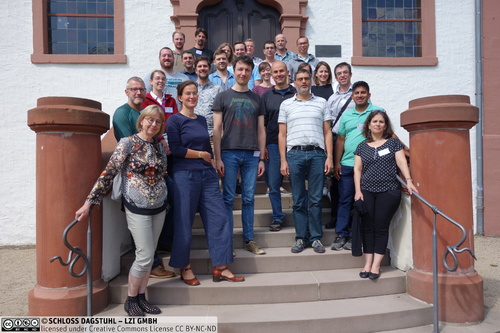Dagstuhl Seminar 19342
Advances and Challenges in Protein-RNA Recognition, Regulation and Prediction
( Aug 18 – Aug 23, 2019 )
Permalink
Organizers
- Rolf Backofen (Universität Freiburg, DE)
- Yael Mandel-Gutfreund (Technion - Haifa, IL)
- Uwe Ohler (Max-Delbrück-Centrum - Berlin, DE)
- Gabriele Varani (University of Washington - Seattle, US)
Contact
- Andreas Dolzmann (for scientific matters)
- Annette Beyer (for administrative matters)
Shared Documents
- Dagstuhl Materials Page (Use personal credentials as created in DOOR to log in)
Schedule
Recent high throughput experimental technologies have greatly increased our understanding of individual steps in RNA-based gene regulation. We can interrogate gene expression, RNA structure, and RNA-protein interactions in a genome-wide manner, and a few paradigmatic systems have been characterized in detail. We can also read out the effects that RNA-binding proteins (RBPs) have on RNA processing, stability, localization, and translation, and we have made progress to determine RNA conformations actually occurring in living cells. However, a quantitative understanding of molecular interactions, and how individual molecular events are integrated into complex intracellular and organism-wide networks of information transfer, remains very limited.
The purpose of this Dagstuhl Seminar is to stimulate the cross-fertilization of ideas between computer scientists and experimentalists, through an open discussion seminar format of approaches that quantitatively tackle the problem of RNA gene regulation and its molecular basis in RNA structure and protein-RNA interaction. In the past couple of years, this field has been greatly affected by the arrival of "single-cell" genomics, i.e., our ability to extract information from many individual cells, thus decomposing averaged observations from bulk data into precise information of events occurring in the single units of life. However, advances have not been limited to technology; we have gained further understanding about additional, previously neglected but important variables such as RNA modifications that may impact structure and interactions, leading to the subfield of "epitranscriptomics". On the computational side, first studies have established the usefulness of deep learning approaches to study gene regulation.
In the seminar, we plan to tackle major challenges in the computational analysis of new experimental data sets in this field. Specifically, we will address these four major topics:
- Modeling RNA-based and RBP interaction networks
- Computational approaches to extend atomic models of protein-RNA interactions
- Novel approaches for designing RNA-binding proteins and RNA scaffolds
- Modelling the impact of RBPs on gene expression
The seminar will be designed to foster the exchange of ideas between the experimental and computational biologists and catalyze the development of new and improved technologies. In this way, we hope to merge experimental analysis with novel mathematical and computational techniques, with the ultimate goal of generating a better quantitative understanding of RNA-based biological regulation.
 Rolf Backofen, Yael Mandel-Gutfreund, Uwe Ohler, and Gabriele Varani
Rolf Backofen, Yael Mandel-Gutfreund, Uwe Ohler, and Gabriele Varani
DNA is often described as the blueprint of life, since it encodes all the information necessary for an organism to develop and maintain its biological functions. Single blueprints for specific functions are stored inside DNA regions called genes. The primary product produced (also termed expressed) from genes is RNA, which can either become biologically active itself (non-coding RNA or ncRNA) or is further translated into proteins (messenger RNA or mRNA), which then executes the gene functions. Given the astonishing complexity of biological functions, it is not surprising that the regulation of gene expression itself is a highly complex matter. Proteins, RNA, and DNA all can interact with each other, forming regulatory networks in order to control the expression of genes. To elucidate these networks, experimental scientists rely more and more on high-throughput methods, producing vast amounts of raw data. Computational methods to analyze these huge datasets are therefore of highest demand. The main focus of this seminar lies on RNA-protein and RNA-RNA interactions. In particular, transcriptome-wide binding patterns of RNA-binding proteins (RBPs), their computational predictability, and the biological effects of binding are discussed. Moreover, the seminar dealt with topics like combinatorial RBP binding prediction, RBP binding kinetics, RNA-RNA interaction prediction, subcellular RNA imaging, and RBP binding site classification. Regarding the computational methodology, several newly developed deep learning methods are presented, e.g. for RBP binding site prediction. Taken together, the aim of the seminar is to bring experimental and computational scientists together for the aforementioned topics and to engage them in fruitful discussions in order to:
- present the current experimental and computational methodologies,
- understand their implications, strengths, and limitations from first-hand experience,
- and spark ideas for developing new computational and experimental methods and improving on existing ones.
 Rolf Backofen, Yael Mandel-Gutfreund, Uwe Ohler, and Gabriele Varani
Rolf Backofen, Yael Mandel-Gutfreund, Uwe Ohler, and Gabriele Varani
- Amir Argoetti (Technion - Haifa, IL)
- Rolf Backofen (Universität Freiburg, DE) [dblp]
- Marina Chekulaeva (Max-Delbrück-Centrum - Berlin, DE)
- Jörg Fallmann (Universität Leipzig, DE) [dblp]
- Jan Gorodkin (University of Copenhagen, DK) [dblp]
- Florian Heyl (Universität Freiburg, DE) [dblp]
- Eckhard Jankowsky (Case Western Reserve University - Cleveland, US) [dblp]
- Hilal Kazan (Antalya International University, TR) [dblp]
- Julian König (Institut für Molekulare Biologie - Mainz, DE)
- Markus Landthaler (Max-Delbrück-Centrum - Berlin, DE) [dblp]
- Donny Licatalosi (Case Western Reserve University - Cleveland, US)
- Yael Mandel-Gutfreund (Technion - Haifa, IL) [dblp]
- Irmtraud Meyer (Max-Delbrück-Centrum - Berlin, DE)
- Neelanjan Mukherjee (University of Colorado - Aurora, US) [dblp]
- Uwe Ohler (Max-Delbrück-Centrum - Berlin, DE) [dblp]
- Yaron Orenstein (Ben Gurion University - Beer Sheva, IL) [dblp]
- Teresa Przytycka (National Center for Biotechnology - Bethesda, US) [dblp]
- Michal Rabani (The Hebrew University of Jerusalem, IL) [dblp]
- Andres Ramos (University College London, GB) [dblp]
- Olivia Rissland (University of Colorado - Denver, US)
- Alexander Sasse (University of Toronto, CA)
- Michael Sattler (Helmholtz Zentrum - München, DE) [dblp]
- Michelle Scott (University of Sherbrooke, CA) [dblp]
- Michael Uhl (Universität Freiburg, DE) [dblp]
- Charles E. Vejnar (Yale University - New Haven, US) [dblp]
- Kathi Zarnack (Goethe-Universität - Frankfurt a. M., DE) [dblp]
- Jianyang Zeng (Tsinghua University - Beijing, CN) [dblp]
Related Seminars
- Dagstuhl Seminar 17252: Computational Challenges in RNA-Based Gene Regulation: Protein-RNA Recognition, Regulation and Prediction (2017-06-18 - 2017-06-21) (Details)
- Dagstuhl Seminar 24491: Deep Learning for RNA Regulation and Multidimensional Transcriptomics (2024-12-01 - 2024-12-06) (Details)
- Dagstuhl Seminar 27051: Deep Learning for RNA Regulation and Multidimensional Transcriptomics (2027-01-31 - 2027-02-05) (Details)
Classification
- bioinformatics
- data structures / algorithms / complexity
- modelling / simulation
Keywords
- machine learning
- computational biology
- genomics
- gene regulation
- RNA





 Creative Commons BY 3.0 DE
Creative Commons BY 3.0 DE
